Artificial intelligence applications for local and regional retail grocers are no longer on the horizon – they are a reality today. Pete Catoe, founder and CEO of ECRS, a retail solutions provider, said AI technology is available to grocers with practical tools they should already be using to enhance the customer experience.
Catoe said two key areas where ECRS’ CATAPULT Retail POS is utilizing AI are consumer targeting through product recommendations and produce recognition.
Product recommendations
ECRS’ Cognition data warehouse uses machine learning to analyze customer data and recommend products. This allows retailers to target promotions and coupons to individual customers, saving time and money.
“It’s not leading-edge technology,” said Catoe, adding that it should be more widely used “because it’s just so useful to the consumer.”
He said AI uses machine learning to discover patterns, customer likes and dislikes, in making item recommendations.
A new AI feature for ECRS can look at 300 manufacturer coupons and narrow those down to about 10 for a particular customer.
“It’s much easier for the customer to look at 10 coupons they are interested in and clip them than it is to search through 300 different items,” Catoe said.
[RELATED: ECRS, CoupDog Complete Initial Integration Phase To CATAPULT Platform]
As an example of item recommendation, a customer may like pepperoni pizza and normally buys Brand A. But Brand B is on sale or has a manufacturer coupon available. Even though that customer has never bought Brand B, there’s a correlation between pizza and pepperoni, “and the pattern is established,” Catoe said.
“That’s using machine learning and natural language processing to do very simple correlations and to help the consumer in their journey.”
Another example is using AI for internal promotions. If a retailer has hundreds of items on sale, the system can narrow that field down to 20 recommendations for a particular customer.
“You have manufacturers’ coupons that can be targeted. You have internal promotions that can be targeted. And then you just have items that you’ve never considered that we think you would like based on your patterns,” Catoe explained.
“That’s because we notice other people that buy the same things that you buy, so you might like these things as well. That’s targeting, giving the consumer that personal touch to help them so they don’t have to wade through a bunch of information. It’s just easy, low-hanging fruit that all retailers, particularly grocery stores, should be using.”
Catoe said it also is important that retailers have their data stored in an efficient manner. To allow a retailer with hundreds of thousands of consumers in its database to offer a personal recommendation, the data must be stored in such a way that machine learning can do the targeting efficiently.
With a lot of items, transactions and customers, the system has to determine what is the most important information for one individual customer.
“My biggest advice to retailers is to make sure they do have their data [stored efficiently]. And that they’re using data scientists or third parties to provide the machine learning to do the targeting. I think that should be done where they control the data, and they have that data,” Catoe said.
He said ECRS has opened up Cognition to other third parties an independent grocer may be using. He added that it is important that grocers’ APIs (application programming interfaces) allow third-party access, so they can utilize all available data for personalization.
“Whoever provides your machine learning, your targeting, that should be open to work with any third party. That’s how we designed our Cognition system to work.”
Produce recognition
ECRS has developed a point-of-sale solution that uses cameras to identify produce items at checkout, thereby streamlining the process.
“I think it’s going to make a huge difference for self-service,” Catoe said.
He noted one of the biggest problems with self-checkout is when customers have to look up produce items. A good recognition system should allow the customer to place the produce item in a clear bag on the scale at checkout, and the system should see through the bag and provide category matches.
If a bag of apples is placed on the scale, all the apples available in that store on that day should display, so the customer can select from four or five items as opposed to looking through hundreds, Catoe said.
ECRS’ produce recognition technology is continually being developed and enhanced. It uses machine learning by training the model to recognize an apple, then tie those apples into a group. Catoe said it is all menu driven.
“You have pictures on the screen, so your new cashier or your consumer will have the same experience, and it’s going to help them. The consumers are just going to love it, and I think new cashiers or part-time cashiers are going to love it as well.”
The system will help keep the lines – regular and self-checkout – moving faster and more efficiently, Catoe said.
While the produce recognition system is being tested in a few CATAPULT-operated retail locations, Catoe said all of its customers should have access to it by 2025.
[RELATED: ECRS Introduces EBT Chip, Tap Technology For Retailers]
Going forward
Catoe said he hopes more independent grocers will begin utilizing AI in their stores.
“I hear a lot of people talking about applying AI in grocery, but I don’t see a lot of people doing it,” he said. “I think it’s because everybody’s moving toward a custom approach. We’re trying to make things generic as much as possible, so they’re easy.
“It’s easier for us to deliver to our customers. I just know that you should be doing it now. You shouldn’t be talking about it anymore.”
ECRS will host its 2024 Ignite Retail Success Conference July 29-31 in Charlotte, North Carolina. Retailers can meet with ECRS experts, carefully-selected industry partners and like-minded colleagues for insightful discussions and demonstrations of innovation.

